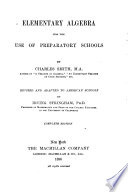 | Popular educator - 1884 - 910 pages
...QUANTITIES. To involve a radical quantity to any required power, Multiply the index of tlie root into the index of the power to which it is to be raised. EXAMPLE. — Thus the square of a* = o'x" = a*. For a$ xa$ = a'. A root « raised to a power of the... | |
 | Charles Smith - Algebra - 1894 - 620 pages
...nt Thus, to raise any power of a quantity to any other .power, its original index must be multiplied by the index of the power to which it is to be raised. 199. To find (ab)1". (ab)m = ab x ab x ab... to m factors, by definition, = (aaa... to m factors) x... | |
 | Arnold Lupton - Coal mines and mining - 1902 - 494 pages
...Ans. III. To raise a number to any power by logarithms. Multiply the logarithm of the given number by the index of the power to which it is to be raised, and the product will be the logarithm of the required power. (1) Find the cube of 30-7140, written thua: (307146)3.... | |
 | Charles Haynes Haswell - Engineering - 1903 - 1092 pages
...rate of excavation? 394.626 days. Involution. RULE.— Multiply logarithm of given number by exponent of the power to which it is to be raised, and the product will give the logarithm of the required power. EXAMPLE.— What is cube of 30.71 r Log. 30.71... | |
 | Joseph Victor Collins - Algebra - 1908 - 442 pages
...exponent oft/us quantity in the quotient. 4. In raising to powers multiply the exponent of a factor quantity by the index of the power to which it is to be raised for the exponent of this quantity in the answer. 5. In extracting roots divide the exponent of a factor... | |
 | Joseph Victor Collins - Algebra - 1910 - 332 pages
...exponent of this quantity in the quotient. 4. In raising to powers multiply the exponent of a factor quantity by the index of the power to which it is to be raised for the exponent of this quantity in the answer. 5. In extracting roots divide the exponent of a factor... | |
 | Robert Édouard Moritz - Trigonometry - 1913 - 562 pages
...power; hence, The logarithm of any power of a number is equal to the logarithm of the number multiplied by the index of the power to which it is to be raised, or If P = Nn, log P = n log N. Thus log 35 = 5 log 3. (¿) ^P = a" ж is the logarithm of the quantity... | |
 | Clement Mackrow - Naval architecture - 1916 - 766 pages
...separately. INVOLUTION AND EVOLUTION BY LOGARITHMS. RULE. — Multiply the logarithm of the number by the index of the power to which it is to be raised. The antilogaritlmi of the result is the number required. Ex. 1. — Find the cube and cube root of... | |
 | John William Norie, J. W. Saul - Nautical astronomy - 1917 - 642 pages
...index of that power : hence, to raise or involve a number to a given power, multiply its logarithm by the index of the power to which it is to be raised, and the product will be the logarithm of the power sought. When the given number is a decimal fraction, reject... | |
 | Joseph Victor Collins - Algebra - 1918 - 360 pages
...exponent of this quantity in the quotient. 4. In raising to powers, multiply the exponent of a factor quantity by the index of the power to which it is to be raised for the exponent of this quantity in the answer. 5. In extracting roots, divide the exponent of a factor... | |
| |